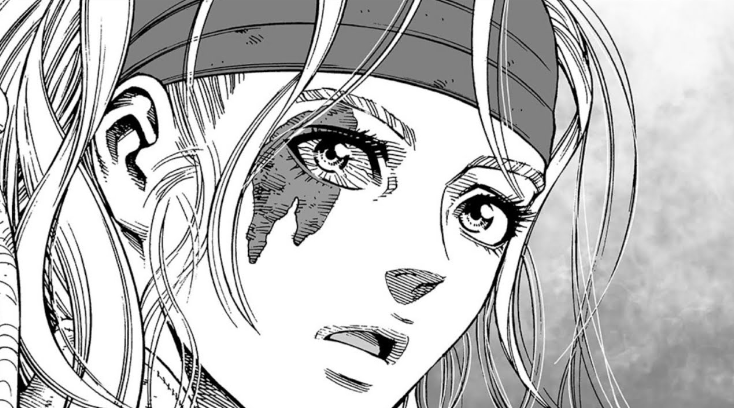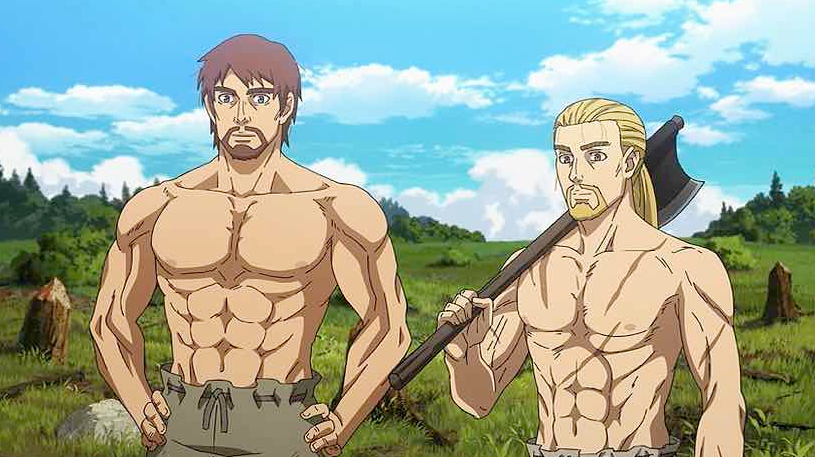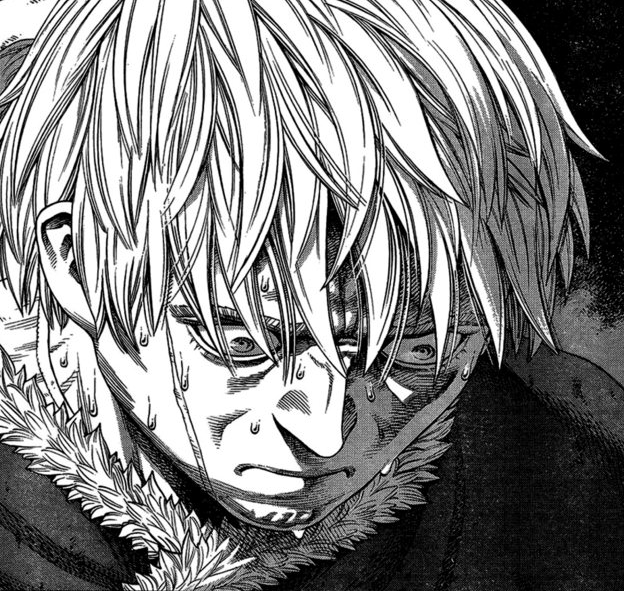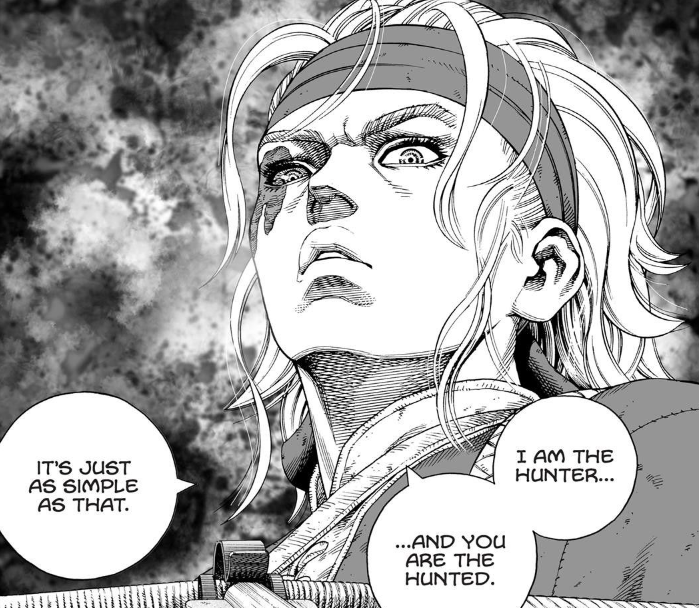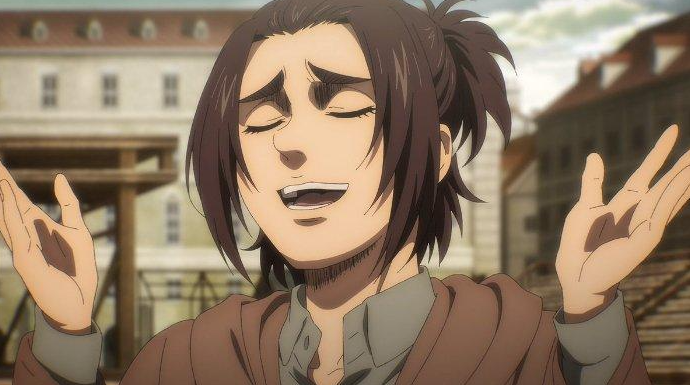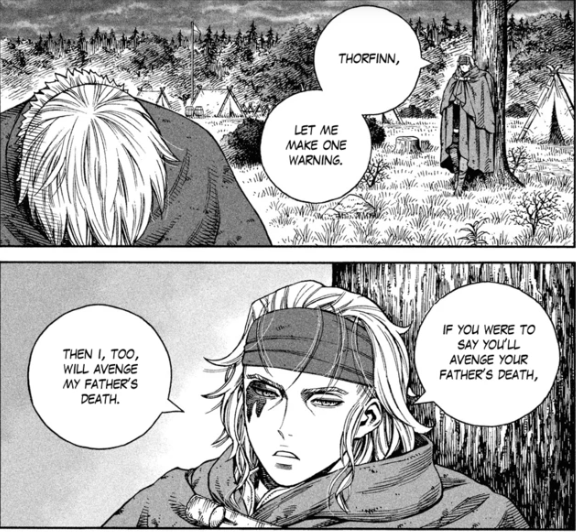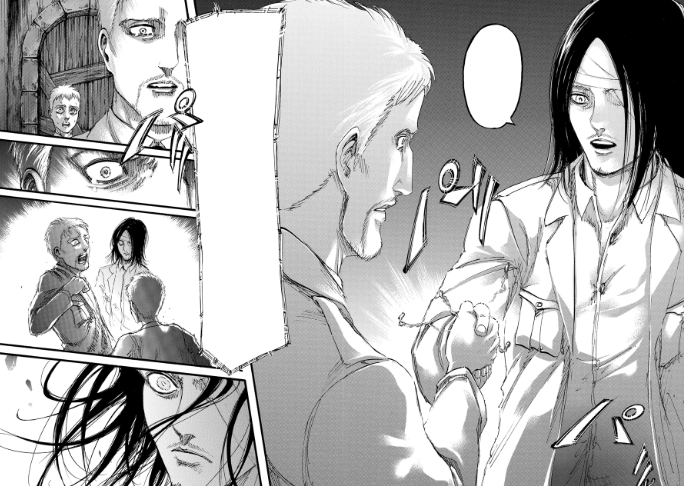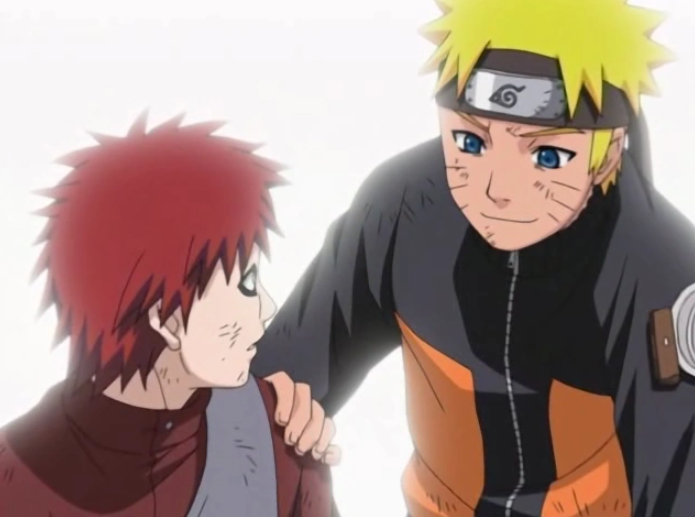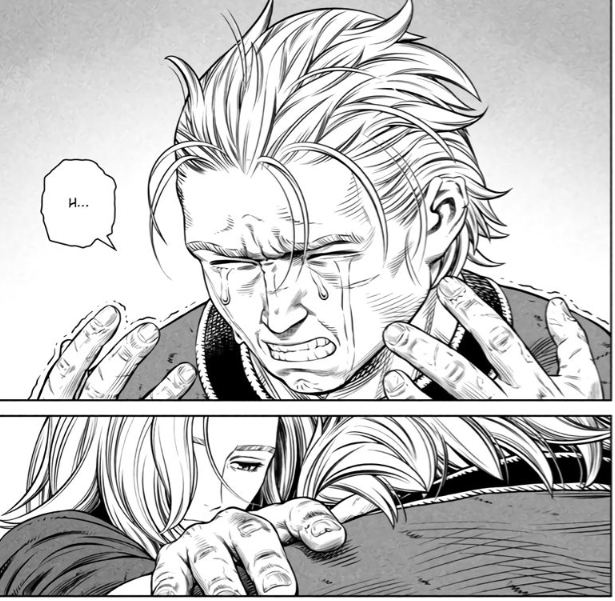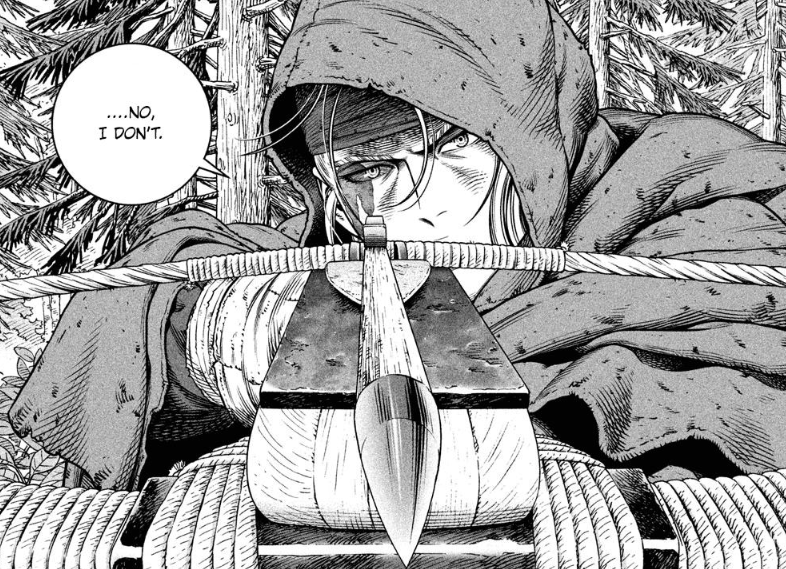Vinland Saga, Hild, and potentially regressive characters
Vinland Saga, by Makoto Yukimura, is one of my favourite manga series. A liberal retelling of the life of Icelandic explorer Thorfinn Karlsefni, the story follows the protagonist after his father’s murder by the crafty Askeladd. Despite Thors’ parting message of peace, Thorfinn dives head first into war and becomes an emotionless fighting prodigy all in order to one day kill Askeladd. This goal is taken from him when someone else kills Askeladd instead.
He goes on a tumultuous and tragic journey of self-discovery. Bolstered by a new pact of non-violence, Thorfinn befriends Einar and others, and eventually sets sail for Vinland, a fabled land of peace.
Definitely not the first image that came up in search, but I chose it anyway.
Along the way, Thorfinn and friends meet a bear hunter called Hild. During a pleasant lunch, Hild reveals that a campaign led by Askeladd resulted in the death of her entire family, and her father was murdered by Thorfinn.
Thorfinn is frozen in horror at the revelation. Hild raises her crossbow, ready to kill. Einar comes to Thorfinn’s aid and an uncomfortable arrangement is made: Hild will join their team, but only to keep watch, mirroring younger Thorfinn’s relationship with Askeladd. It’s far from the idyllic adventure our crew had been anticipating.
A literal jump scare. Thorfinn’s anguish is so palpable here.
At this moment in the story, Hild is a superfluous character. Thorfinn already walks with guilt. There is no need for a literal personification of it. Hild very rarely talks, and mainly exists as a shadow in the background of the pages in which she features. When she does talk, it’s just to remind Thorfinn that she’s there to kill him. Hearing this once or twice is ominous, but when it becomes a character’s only refrain, the words lose their impact. Overall, she’s not given much to do. Ray from The Promised Neverland rings a bell here.
Readers who support Hild’s early chapters often argue that she’s a reflection of who Thorfinn was: a child turned warrior through hardship, coexisting with the source of her anguish, driven by vengeance. But why do we need a genderbent repeat of Thorfinn’s story? We’ve just been through this with Thorfinn. We’ve spent years’ worth of chapters following his descent into bloody anger and his slow climb to redemption. We as the readers observe Thorfinn’s behaviour—we don’t need Hild to do this for us.
She’s also hot.
Additionally, the relationship between Thorfinn and Hild is without the nuanced, intricately written saga of Thorfinn and Askeladd. For the latter, we observe a deeply complicated interaction of enemies that incorporates mentorship, fractured fatherhood, begrudging respect, and genuine care. When Thorfinn grips Askeladd’s bloody clothes, ordering him not to die, we can see the unspooling of all the elements of what made their relationship so riveting, heart-breaking, and tense, to follow. Whatever Thorfinn and Hild is supposed to be, it could use more depth.
The same support is given to Gabi from Attack on Titan. She enters the Marley Arc as a younger, female version of Eren. We retrace Eren’s journey through Gabi, but from “the other side of the ocean”. Many people praise the deepness of having Eren mirrored in another child from another place, but I find it tiresome. Like Thorfinn, we’ve already seen the journey. We don’t need a replica: as a reader, I want to see the story move forward. Forcing us to repeat the journey and return to the old themes we’ve already experienced and learned from feels more like a plot regression than a development.
Whenever I feel depressed about AOT I just imagine Levi with his adopted children Gabi and Falco and uncle Onyakopon drinking tea in their predominantly Black London-coded home and the world seems right again.
Conversely, the remarkable thing about Gabi is her quick turnaround. Considering her age and the intensity of Marley’s brainwashing, it only takes a few days for Gabi to realise that she was wrong about Paradis. This is very different from Reiner and co, who spent years on Paradis but still struggled to come to terms with their internal conflict. For that, and for her ability to melt the hearts of Magath and Pieck, her inclusion in the story is valuable, and her connection to Sasha, the Blouse family, and Kaya, are profound. Those introductory chapters are jarring, but I appreciate the rest of Gabi’s story. Isayama did more with her, and she was active in the plot and helped to move things along.
I don’t think Hild receives the same treatment. Whilst the rest of the Vinland Saga characters progress in some way, either aesthetically or morally, Hild is frozen in the past. Multiple timeskips later, and Hild is the same Hild. Barely talking, still holding onto her crossbow, still watching Thorfinn. I was stunned when the final stretch to Vinland began, and so much time had passed that Karli was a walking, talking toddler, that Hild hadn’t progressed. It was at that point I had to ask “what was the point?”. I would have loved to see more of Hild as a person.
Yes, Hild, we know.
Going back to Attack on Titan, Isayama shows another way to reflect the journey of his protagonist in a secondary character, whilst still maintaining that character’s autonomy. In the Marley Arc, we follow Reiner’s past, re-tracing his struggles as a young soldier vying for warrior candidacy. Unlike Eren, who awakened his determination after witnessing the death of his mother, Reiner’s driven by the promise of becoming an honorary Marleyan, and he shoulders the burden of his mother’s personal tragedy. Like Eren, he’s weak compared to others, but he perseveres, recreating himself into a heartless leader until he enters the scouts and comes second only to Mikasa. When Reiner tells Shadis that he wants to “save the world”, the reader appreciates the multi-layered meaning of this message.
Reiner looks at Eren’s weaknesses and sees the child Reiner from Marley; he hears Eren’s declaration to save the world from Titans and empathises with the sentiment. When they meet as adults beneath Willy Tybur’s stage, Eren says “Reiner, I’m just like you”, and it’s devastating for Reiner to hear. Reiner and Eren live two very unique experiences, and their stories are markedly different, but the parallels are obvious and poetic, all leading to that fatal confrontation in Marley.
One of the greatest chapters I’ve read of anything. What a convo.
I’m going to give honourable mention to Gaara and Naruto simply because Gaara’s life is heavily reminiscent of Naruto’s, but the divergence of their stories is what makes their confrontation so powerful. Because their circumstances are so similar, Naruto can empathise with Gaara’s agony, but there are key moments that separate them: Naruto finding solace in Iruka paired with his natural boisterous nature and persistence. In contrast, Gaara internalises everyone’s hatred and chooses a markedly different path, totally unable to notice the love of his two siblings who had been there for him the whole time. Many parallels, but each character is their own and they affect the story differently.
“he just like me fr”
… and of course, Googling “Naruto and Gaara” sends me straight to all their ship content. Of course.
But something outstanding happens in chapter 191 of Vinland Saga. Hild is front and centre as we witness how her engineering expertise has helped the Vinland settlers. She’s an integral part of their community. She blushes, mortified, as everyone praises her threshing machine. Such a short sequence of events, and so much of Hild’s personality shines through. Later, Gudrid tells Thorfinn she’s pregnant, with Hild and Einar as witnesses. As Hild watches Thorfinn cautiously celebrate the upcoming addition, she sighs, unties her headband, and makes an announcement of her own. “Thorfinn,” she says, “I forgive you.”
No no don’t mind me, just bawling my eyes out.
Admittedly, I can’t read the chapter without crying. Thorfinn’s breakdown, Einar and Gudrid’s silent tears as they watch, and Hild’s speech, in which she praises Thorfinn’s resilience and declares him a true warrior, is too beautiful.
It still would have been beautiful if we had seen more of Hild in the preceding chapters. She was battling her own demons, and she too became a true warrior through the ordeal. The story would have been richer if we saw Hild’s journey as her own character, and not as Thorfinn’s shadow. We could have witnessed Hild providing alternative paths to peace that Thorfinn, from his war-weary perspective, simply doesn’t have the skill to devise. Hild could have been more, and I mourn the absence of her presence in those previous chapters.
Adding this here for some balance. I enjoy seeing Hild and Karli together. It doesn’t happen often, but these snapshots of their relationship also add depth to her character.
Interestingly, Hild gains greater prominence in the story immediately after this chapter. She talks more, interacts with other characters more, and at this current ongoing crisis, has thrust herself to the forefront, making decisions without Thorfinn’s input. You could say that unshackling herself from the bonds of vengeance made her more motivated, but I question if we really needed so many chapters of her not doing much to compensate this.
Chapter 191 is emotional but we’re only seeing things from Thofinn’s perspective. This was framed as his personal battle, and Hild commends his struggle. It would have been exceptional and doubly emotional to see them comfort each other if the story had strongly emphasised both their journeys. Gudrid and Einar feel more fleshed out because we see more of them. And despite her length of time in this series, we’re only really getting to know Hild now, after Thorfinn has achieved forgiveness.
Uh oh she’s back.
Now that Hild is finally emerging in the story as a character separated from Thorfinn’s past, I look forward to how she develops and interacts with the growing conflict. Hild obviously doesn’t hold the same beliefs as Thorfinn when it comes to nonviolence, and I hope she is able to maintain her independence from Thorfinn’s ideals and play a vital role in the politics of Vinland. She clearly admires Thorfinn and wants Vinland to succeed, but unlike Einar, Hild plans to actively interrogate her community. It took some time, but Yukimura’s finally giving Hild an arc, and a story, of her own.
